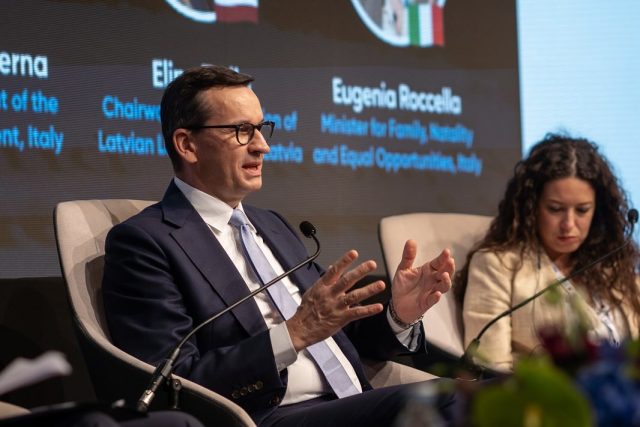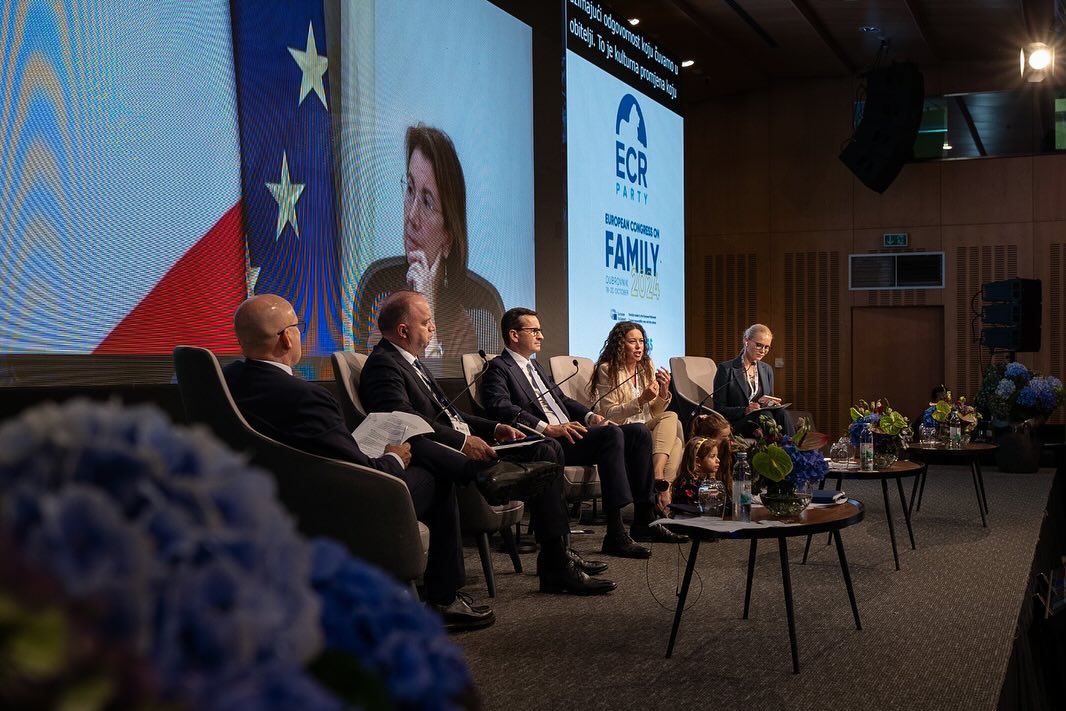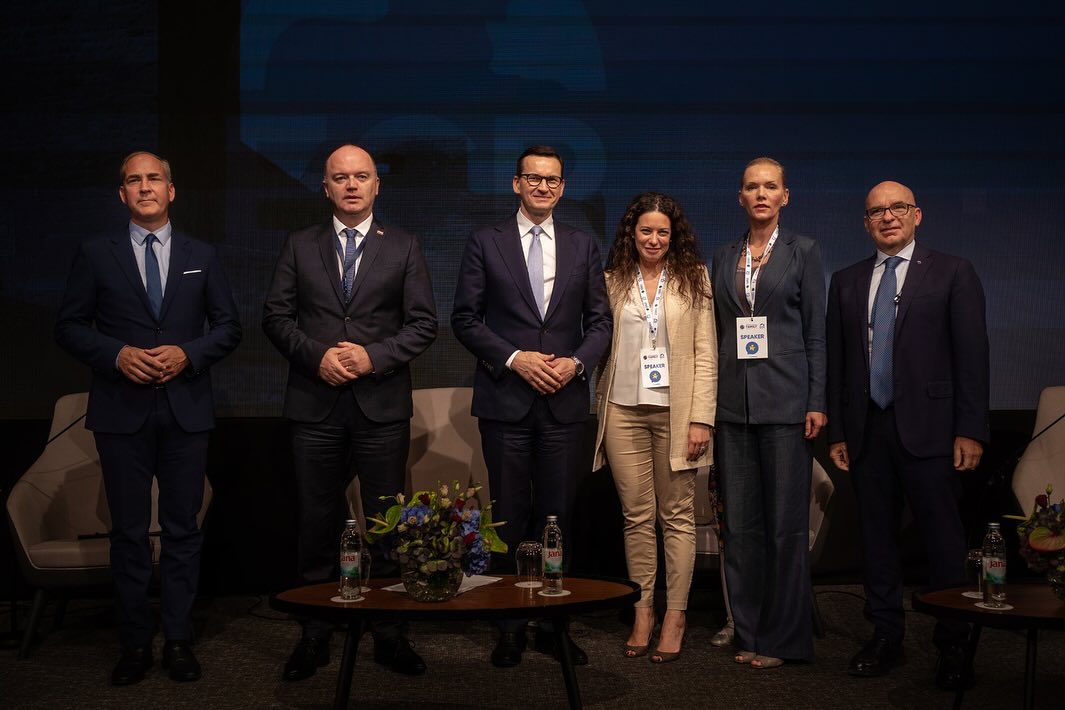
Firm roots, new horizons: Conservative Family Values in a Changing Europe was the last panel during the debates of the European Family Congress 2nd edition, held on October 18th-20th in Dubrovnik, one of the most beautiful cities in the world.
Opinions on how important it is to maintain conservative family values in Europe’s evolving landscape were expressed in front of a large audience present at the conference. The debate was moderated by Antonio Giordano (MP, ECR Party Secretary General, Italy) and Ivan Šipić (Minister of Demography, Croatia), Mateusz Morawiecki, (Former PM, Poland), Antonella Sberna (MEP, Vice President of the European Parliament, Italy), Ante Šušnjar (Minister of Economy, Croatia), Elina Treija (President of the Latvian Union of Numerous Families, Latvia) during the online debate and Eugenia Roccella (Minister for Family, Natality and Equal Opportunities, Italy).
We all know that one of the conservative core values is the family. The family is the primary place where love and happiness are born and it is also considered the cornerstone of society. This is why conservative values support the traditional family structure (marriage as an institution between a man and a woman is central to conservatives), which is considered essential for the moral and emotional upbringing of children.

There are two words that currently define European society: the struggle between values and homologation. If we recall, in the Chinese regime under Mao Zedong, all people were considered equal, with no difference between men and women. The way to destroy the resistance and resilience of our desires is to have people on the same level, without any differentiation of individuality, of sexuality. It is the key to success to destroy people’s independence and their will to live. Here the challenge arises: homologation versus values.
The question is: where is Europe heading with the laws that are currently being adopted and the decisions that are being born in Brussels? Many of these directives and laws are against the traditional family. That is why Europe needs to go back to its roots and regain people’s trust.
“Some people are preoccupied with a lot of other issues, i.e. another continent. All this time we in Croatia, through the Patriotic Movement party to which I belong, have decided to go the way of preserving our values: family-Christian, family-traditional. Through the measures we will provide through the Government. Diversity means richness for our people but we have to protect our values as a nation, as Europe. The Croatian government is aware of the low birth rate situation and that is why we will adopt laws to support the birth rate increase”, said Ivan Šipić Minister of Demography, Croatia.
For some time we have been facing an economic, political and cultural crisis at European level. The current changes at European level are throwing more and more uncertainty on the shoulders of ordinary citizens. What might the future of Europe look like?
“I couldn’t imagine a more important topic than the future of the family in Europe. I just think that without reshaping our family policy in Europe, there will be no Europe unfortunately! We need to refocus all our strategies and I congratulate the Croatian government because I remember how Prime Minister Andrej Plenković, very often mentioned, together with me and Viktor Orban and not many others at the European Council level, how important it is to implement family and natural family policies and to raise the family on the agenda of the European Union. Two major forces are now shaping the world around us. One is the changing global strategic order which I think is visible to everybody and the other is the cultural change and the changes due to technology. These two forces put a lot of pressure on all of us and particularly on Europe. If we look at it from this perspective I think there are things that are changing our landscape very rapidly and change is the nature of the game. And let’s be aware of that”, argued Mateusz Morawiecki, Former PM in Poland.
If we talk about the models of the European Union, Germany, the Netherlands, Belgium and the other western European Union countries, first of all they can be considered as models of the last 40-50 years for cheap energy from Russia, cheap resources, cheap gas from Russia. Secondly these countries benefited somewhat from free security from the US at least until 1989 when there was a huge change in security and many other policies. The third aspect that characterizes the western EU countries is that the products they produced sold them with a high profit margin on the Chinese and East Asian market. The fourth pattern from which the western EU countries benefited was cheap labor. It was this cheap labor that the countries of Central and Eastern Europe were deprived of. The citizens of Central Europe (over 10 million people) in the Czech Republic, the Czech Republic and Poland were taken by other countries. Naturally, it was an individual decision but the younger generation, generation after generation after generation fled to the West. We can hope that this era is now over.
Latvia is facing a major crisis in the number of newborns and this is having a negative effect on the economy.
“For us Latvia, as a small nation, the tragedy is not the percentage drop in the birth rate, the tragedy is the low number of newborns. There will be only 12,000 newborns in 2024. This is not just an economic problem. This is a risk to the survival of our nation. It’s a risk for our security, our internal security of course,” said Elina Treija, president of the Latvian Union of Numerous Latvian Families, Latvia.
“I believe in a conservatism based on values and common sense at the same time. I believe that there are so many crazy ideas around us attacking us from all sides that common sense will be more and more valuable to different populations in different groups. That is why I am cautious in expressing my optimism. While we cultivate our values, when we maintain a common sense approach we will be listened to. Secondly, without roots, blood cannot flow. I think more and more people are realizing that we do have to have roots. These roots mean family, tradition, the experience of previous generations which means value because without them we don’t really realize what has happened for so long and it will be very difficult to build the steps of the future.
In an age of sacrilege and living without values, I believe that the conservative movement may represent the most important thing in our lives why we live on this earth, all that we do why do we do all this? For the next generation for our friends for our family for our nation. In an age of radical individualism, the isolation we have experienced, I believe that we conservatives can promote community life and family values. Conservatism is a stabilizing force today in a multipolar world. We understand all those who are suffering on our continent but in our charity we have to take care of what is most important for our nation, for our community and look at all this from a European angle and for our European values: democracy, freedom, solidarity, justice”, concluded Mateusz Morawiecki (Former PM, Poland).
Debates at the European Family Congress in Dubrovnik concluded that redefining family policies to secure Europe’s future is important. During the two-day conference, panelists highlighted that the traditional family, considered the moral and social foundation of society, is under severe pressure due to current cultural and economic changes. They warned that without a return to fundamental values and support for the birth rate, Europe risks losing social cohesion and national identity. It was also stressed that policies promoted at European level tend to undermine the traditional family structure and this could lead to long-term social destabilization.

The examples of pro-birth policies in Croatia and concerns about the falling birth rate in Latvia illustrate an urgent need to rethink strategies at national and European level to protect and revitalize the family. It was also emphasized that preserving conservative values can serve as a stabilizing anchor in an increasingly fragmented Europe influenced by global and technological change. Participants at the second European Congress of Families argued that Europe needs to get back to its roots and promote policies that foster family and community, stressing that the future of the European continent depends on reinforcing these core values.



 Subscribe
Subscribe